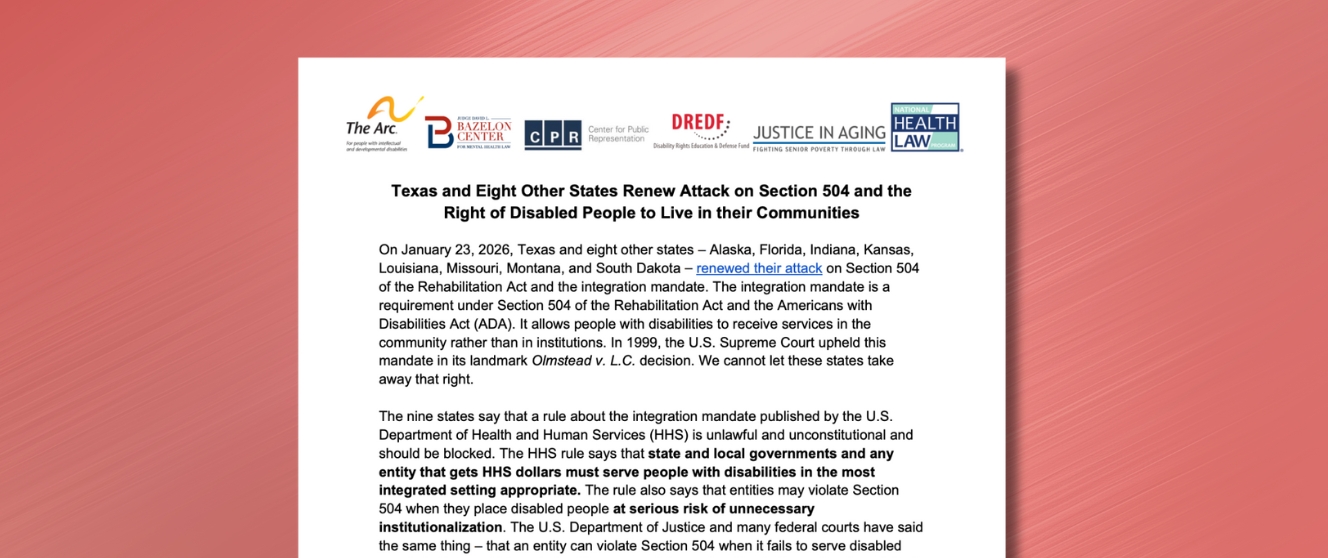
September 11, 2017
Submitted online at www.regulations.gov
Ms. Seema Verma
Centers for Medicare & Medicaid Services
Department of Health and Human Services
P.O. Box 8016
Baltimore, MD 21244-8013
Re: Revisions to Payment Policies under the Physician Fee Schedule and other Revisions to Part B for CY 2018; Medicare Shared Savings Program Requirements; and Medicare Diabetes Prevention Program (CMS-1676-P)
Disability Rights Education and Defense Fund (DREDF) appreciates the opportunity to comment on the proposed Revisions to Payment Policies under the Physician Fee Schedule and other Revisions to Part B for CY 2018; Medicare Shared Savings Program Requirements; and Medicare Diabetes Prevention (Proposed Rule). DREDF is a leading national law and policy center that works to advance the civil and human rights of people with disabilities through legal advocacy, training, education, and public policy and legislative development. We are committed to increasing accessible and equally effective healthcare for people with disabilities, and eliminating persistent health disparities that affect the length and quality of their lives.
Our comment on the Proposed Rule is specifically in support of the two proposed new HCPCS G codes, GYYY1 and GYYY2, to address prolonged preventive service(s) needed beyond the typical service time of the primary procedure. There are many factors that may result in Medicare beneficiaries with various disabilities needing additional time from practitioners to receive the benefit of a scheduled or needed Medicare-covered preventive service. For example, people with hearing, vision or developmental disabilities may require additional time for effective communication with the provider during an appointment, people with multiple chronic conditions (including mental health disabilities) may need additional time to discuss drug interactions with their practitioner during wellness and counseling visits, and people with mobility disabilities may require a range of assistance that will take additional time, ranging from help with dressing to assistance with transfers and positioning during cancer and other physical screenings. We therefore anticipate that the proposed HCPCS G codes will lead to a clear and measurable benefit for Medicare patients with disabilities, as well as Medicare practitioners who must be prepared to serve an aging Medicare population, and who are also accustomed to having fee schedules that guide their expected allocations of resources and time.
While DREDF is aware that physical and programmatic accommodations and policy modifications are already required from healthcare providers who are obligated to ensure the provision of equally effective treatment to patients with disabilities as a matter of federal disability rights laws, we nonetheless applaud CMS devising practical and positive incentives for providers to comply with such long-standing law. We also support the fact that that the proposed codes are limited to being billed in conjunction with Medicare-covered preventive services, an area in which beneficiary coinsurance and deductibles are not applicable under current law. As a result, Medicare beneficiaries will not bear any financial or administrative burden for receiving accommodations that are already due under law. We believe that this is an important consideration and component of the billing codes since federal law prohibits charging people with disabilities for physical or programmatic accommodations or policy modifications needed for the provision of fully accessible services or benefits.
At the same time, we recognize that Medicare beneficiaries, and indeed all people with disabilities, face ongoing barriers, health and healthcare disparities in many areas of healthcare beyond preventive services. We urge CMS to continue to work with the disability community and stakeholders to devise innovative solutions as part of a comprehensive approach to ensuring equal healthcare access for people with disabilities. Some of these solutions could involve:
- Pilot projects that track beneficiary health benefits, in terms of reduced or delayed emergency room visits and institutionalization, and resulting cost savings, associated with fully funding prolonged time needed for healthcare services beyond preventive services.
- Rewarding providers who make initial investments in more efficiently serving Medicare beneficiaries with significant functional disabilities, such as buying accessible weight scales and height-adjustable examination tables and training staff in their use or developing ongoing relationships with sign-language resources shared with other providers, and who subsequently or simultaneously serve greater proportions of people with disabilities in their overall patient mix.
- Directly requiring information concerning patient functional disabilities and corresponding physical or programmatic accommodation needs to be included and filled in the patient’s electronic health record so that all of a Medicare beneficiary’s practitioners can see what an individual patient needs in order to receive effective healthcare services.
- In the event that CMS, in future, changes the standards and documentation requirements for the history and physical exam components of Evaluation and Management (E/M) visits, those requirements should be kept and only gradually reduced over time for people with significant and multiple functional disabilities.
Please note that this last bullet point is submitted partially in response to the Proposed Rule’s solicitation of stakeholder comment on whether “removing the documentation requirements for the history and physical exam would be a good approach.” DREDF is providing input on this question because we believe it is closely related to the experiences of many people with disabilities who have historically encountered various physical and programmatic barriers to receiving effective E/M visits, as well as preventive care visits. People with mobility disabilities often have completely outdated information in their records concerning such basic aspects of a physical exam as weight and height, and their physical exams may typically exclude examination of body parts and systems that are difficult to reach when one is seated in a mobility device. People with disabilities that affect their ability to communicate in spoken or written English may have had very few opportunities to relate or go over their medical histories with practitioners, who may be relying on old or incorrect information in the record that has never been pointed out to the individual patient, or perhaps has never been solicited from that patient. Since Medical decision-making can only be accurately formed upon a substantial basis of accurate and timely information, which may be absent for patients with complex and significant functional disabilities, DREDF believes that detailed history and physical exam requirements are still necessary for this population, at least until health and preventive screening statistics for everyone in this sub-population reaches parity with those of the general population.
Finally, DREDF submits that it is critical to gather data on the use of the proposed HCPCS G codes once they are finalized. How often are the codes submitted, what are common additional allocations of time needed for each service, and how much additional time is needed for different kinds of functional disabilities are examples of the kinds of questions that must be asked and tracked. We deeply appreciate CMS’s explicit reiteration within the Proposed Rule of its commitment to addressing disparities for individuals with disabilities and advancing health equity. Data gathered from the use of these new Medicare –preventive service codes will help validate the accommodation needs of patients with disabilities and accurately capture resource costs that are needed before patients with different or multiple disabilities can receive appropriate and equally effective healthcare services of many kinds.
We consider disability to be a natural part of the human condition and something that touches virtually every life, experienced among one’s family and friends over one’s lifetime and individually as one ages. We would like to emphasize once again that quality and effective healthcare for people with disabilities, across all healthcare services, is a universal necessity and not a “minority” or specialty interest concern. Preventive healthcare services are crucial for ensuring that people with disabilities can maintain healthy and productive lives in their communities, and DREDF recognizes that Medicare is moving toward encouraging practitioners to take any needed additional time to ensure that such services are fully accessible, but ultimately the Medicare system must also work to ensure that when healthcare procedures and operations are needed they are also provided in a fully accessible manner.
Thank you again for the opportunity to provide comments. We would be happy to further discuss, at any time, the issues we have raised above.
Yours Truly,

Silvia Yee
Senior Staff Attorney

